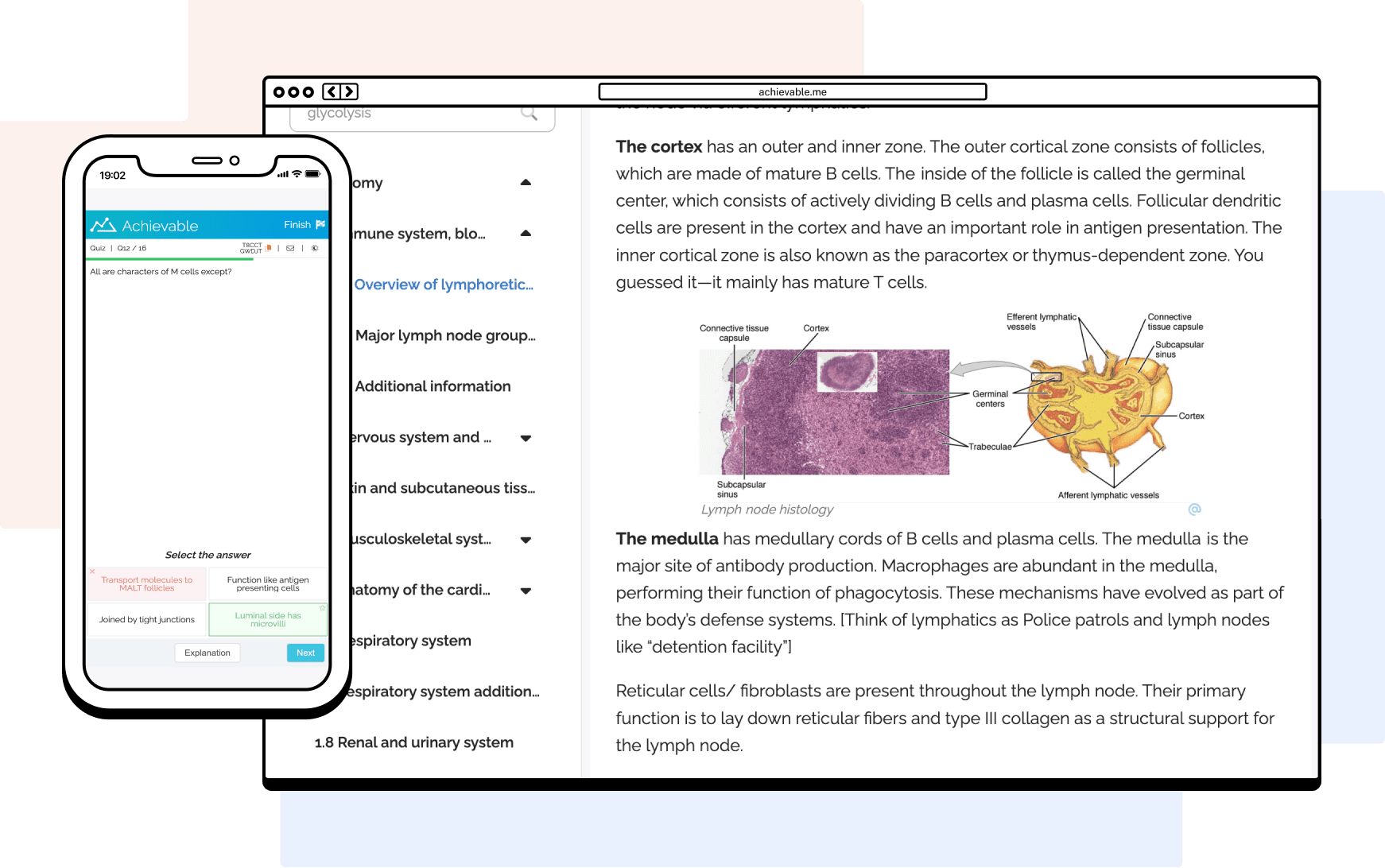
MCAT Exam information
What it is, what's tested, and how it's scored.

MCAT exam details
The Medical College Admission Test (MCAT) is the most widely recognized exam for medical school admissions. The MCAT is administered by the AAMC (Association of American Medical Colleges) several times throughout the year, from January to September. It consists of four sections: Biology/BioChemistry, Chemistry/Physics, Psychology/Sociology, and CARS. Achieving a high MCAT score is the gateway to the medical school of your dreams.
The MCAT exam is hosted by AAMC and costs $345 to register. Participants have 6 hours 15 minutes to answer 230 multiple-choice questions. Target scores vary: Average: 500/528, Good: 511+/528, Competitive: 515+/528.
Time
6 hours 15 minutes
Format
230 multiple choice questions
4 sections
Exam fee
$345
Target score
Average: 500/528, Good: 511+/528, Competitive: 515+/528
Details
The MCAT is considered one of the most challenging graduate school exams due to its extensive length and question structure. The exam lasts approximately 7.5 hours, which includes two 10-minute breaks and a 30-minute lunch break.
Biological and Biochemical Foundations of Living Systems: 59 questions, 95 minutes
Chemical and Physical Foundations of Biological Systems: 59 questions, 95 minutes
Psychological, Social, and Biological Foundations of Behavior: 59 questions, 95 minutes
Critical Analysis and Reasoning Skills: 53 questions, 90 minutes
All questions are passage-based, so there is a lot of information to decipher and various topics to reference.
The MCAT is scored from 472 to 528, with an average score around 500. Each section is scored from 118 to 132. The MCAT is not a pass/fail exam, and scores are ranked as a percentile among other test-takers in the same testing year. The exam fee is $345, with AAMC Fee Assistance Program reducing it to $140 for eligible applicants.

MCAT exam summary
Biological and Biochemical Foundations of Living Systems (BBLS)
95 minutes
59 passage-based questions
Biology, organic chemistry, cellular and molecular biology, biochemistry, scientific reasoning, research and statistics.
This section covers the core biology and biochemistry needed to understand how living organisms function at the molecular and cellular levels. It also covers the structure and function of proteins, genes, and organ systems, as well as metabolism, genetics, cell processes, and molecular assemblies. Topics include prokaryotes, viruses, the nervous and endocrine systems, and how cells grow, differentiate, and communicate in the context of health and disease.
Chemical and Physical Foundations of Biological Systems (CPBS)
95 minutes
59 passage-based questions
Biochemistry, molecular biology, physics.
This chapter explores chemistry and physics underlying how the body works, with a focus on their application to biological system motion, energy, fluid dynamics, and electrochemistry, along with atomic structure, molecular interactions, and solution chemistry. Key topics also include chemical kinetics, thermodynamics, spectroscopy, and the behavior of biologically relevant molecules, plus how enzymes and lab techniques tie these principles to real-world biology.
Psychological, Social, and Biological Foundations of Behavior (PSBB)
95 minutes
59 passage-based questions
Psychology, sociology, biology, mental processes and behaviors.
This is the science behind how people think, feel, and act as individuals and in groups. This chapter covers psychological and sociological concepts that influence behavior, including perception, learning, memory, identity, mental health, group dynamics, and social structures. Research methods, demographic factors, and social inequality are also explored in the context of healthcare and human behavior.
Critical Analysis and Reasoning Skills (CARS)
90 minutes
53 passage-based questions
Ethics, philosophy, health, social sciences, humanities, scientific reasoning.
This covers everything related to the CARS section of the MCAT, including the types of passages and questions you'll encounter, core reading and reasoning skills, and practical strategies for managing time and complexity.

Achievable MCAT content outline
1
CARS - Critical Analysis and Reading Skills
This covers everything related to the CARS section of the MCAT, including the types of passages and questions you'll encounter, core reading and reasoning skills, and practical strategies for managing time and complexity.
2
Psych/Soc - Psych, social, and bio foundations of behavior
This is the science behind how people think, feel, and act as individuals and in groups. This chapter covers psychological and sociological concepts that influence behavior, including perception, learning, memory, identity, mental health, group dynamics, and social structures. Research methods, demographic factors, and social inequality are also explored in the context of healthcare and human behavior.
3
Bio/Biochem - Biological and biochemical foundations of living systems
This chapter covers the core biology and biochemistry needed to understand how living organisms function at the molecular and cellular levels. It also covers the structure and function of proteins, genes, and organ systems, as well as metabolism, genetics, cell processes, and molecular assemblies. Topics include prokaryotes, viruses, the nervous and endocrine systems, and how cells grow, differentiate, and communicate in the context of health and disease.
4
Chem/Phys - Chemical and physical foundations of biological systems
This chapter explores chemistry and physics underlying how the body works, with a focus on their application to biological system motion, energy, fluid dynamics, and electrochemistry, along with atomic structure, molecular interactions, and solution chemistry. Key topics also include chemical kinetics, thermodynamics, spectroscopy, and the behavior of biologically relevant molecules, plus how enzymes and lab techniques tie these principles to real-world biology.

Hit your target score
Achievable is the best online MCAT exam prep course: effective, personalized, and convenient. With Achievable, you'll spend less time studying and hit your target score with confidence.